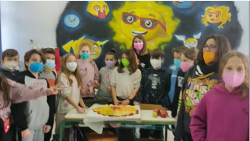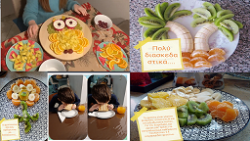Hosted by SALL , contributed by Gena on 20 April 2022
Our project is an innovative action, which aims to activate students' action on issues related to healthy nutrition. The design and objectives of the project "Healthy Nutrition, Sun caress, and life" are based on modern learning theories - the sociocultural - problem-solving, discovery of new knowledge in collaboration with appropriate adults, active citizens, schools open to society- and theories of person-centered psychology (positive self-image, empathy, values, cooperation, acceptance of the different, self-realization, environmental empathy). Teachers and students during the project use creative tools of ICT, which, not only facilitate learning and activate internal learning motivation and interest of students but strengthen the perception of learning as a learning activity fully integrated into the social, historical, and cultural context in which it takes place. Students learn how to be active citizens-statehood-, to solve problems, to try through their actions to change these situations that hinder the well-being of citizens but also to spread positive actions that will help in positive change. They will first attend information on healthy nutrition (food pyramid, crop production, pesticides, organic products, environmental protection), and then the class teacher taking on the role of animator asks questions to the members of the class group:
• From where does a person get the energy to move, to create, to work, to respond positively to his daily activities?
• Do we eat healthily?
• Do you know the food pyramid?
• What effects can an unhealthy diet have on human health? (obesity, anorexia, bulimia…)
• What should our daily diet include?
• What is the role of breakfast in a person's daily life?
• When do we eat more?
• What is the role of our emotions in the diet we follow?
• Does the change in our weight play a role in our psychological mood?
• What problems can the so-called "fast" diets cause in the human body?
• How do stereotypes - thin = successful, external appearance - affect our psychology?
• How are the working conditions of a farmer? What does the farmer use today to produce the products?
• Do I import food products from other countries? Do we export products?
• What are the seasonal products? Why do we need to know the products of the season?
which lead to specific actions:
All these questions-searching and discovering new information are discussed in the classroom group and the students look for information by working in groups of four members in the classroom laboratory, presenting it to the classroom, and create projects using ICT, art, and science. The goals of the program were organized based on the goals of the curriculum and the activities that will take place during the school day-interdisciplinary program.
The students
I. Solve problems justifying the solutions they propose
II. Discover new knowledge about healthy eating
III. To investigate the role of nutrition in achieving their goals
IV. Discover the types of diet and the right amounts depending on age, gender, and daily activities.
V. To compare the modern diet with the diet of the grandparents, what has changed, what has remained the same
VI. Discover the secrets of the Mediterranean diet and its role in the physical and mental health of the individual
VII. Seek information on the effects of unhealthy eating in all areas of personal life and categorize it
VIII. To develop skills and experiences of researcher, journalist, creator, writer
IX. To seek information about the cultivation of products, and the concept of "organic" products.
X. Collaborate with appropriate adults and take action as active citizens to solve nutrition problems
XI. To reflect and interact.
XII. To develop ICT skills, learn creative web2.0 tools, and use them in the presentation of their works (individual & group activities, digital literacy)
Teachers will use modern pedagogical methods, such as problem-solving, interpretive method, argumentation, teamwork, classroom-laboratory, self-observation, endoscopy, and creative use of ICT.
Students will take action, and will play different roles: collaborator, explorer, journalist, creator, scientist, mathematician, artist. The activities will take place during the teaching of most cognitive subjects such as Language, Mathematics, Foreign Language, Art Courses, Informatics, Social and Political Education. According to the theoretical framework of the curriculum, the modern open school should take care of the overall personal development. of students: cognitive, emotional, and social development and the cultivation and development of critical and creative thinking as well as thinking routines.

